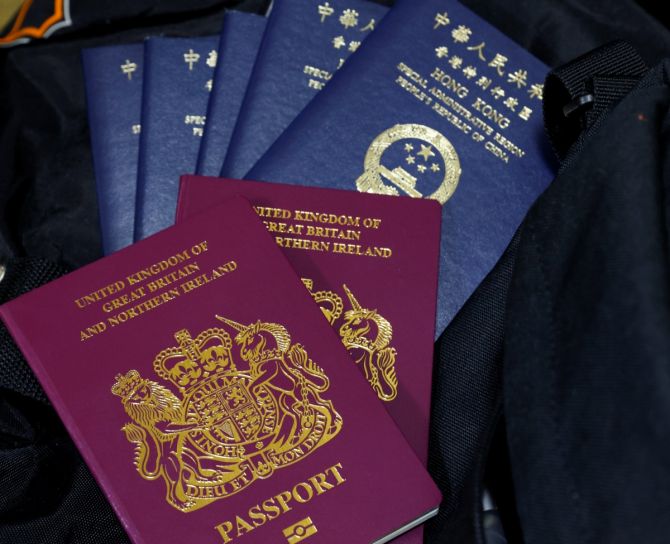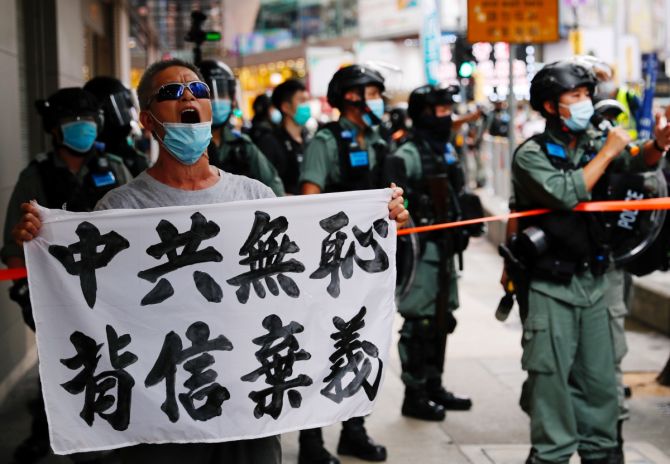Britain and China have clashed over the offer of British National Overseas passports to Hong Kong residents, observes Rup Narayan Das.

A fresh row has cropped up between Great Britain and China about the offer of British National overseas passports to Hong Kong residents, a move which is vehemently protested by China.
The online portal inviting applications from eligible Hong Kong residents was opened on January 31.
As of now, as many as 5,000 applications have been received so far, out of which half of them are already residing in the United Kingdom.
Hong Kong was transferred to Chinese sovereignty on July 1, 1997 under a novel system of 'one country, two systems', which envisaged that the extant political and economic system in Hong Kong will remain unchanged for fifty years after the reversion of Hong Kong to the Communist regime.
The handover of Hong Kong to China was not just the transfer of territory, but also handing over a populace used and acclimatised to the ethos and milieu of liberal democracy.
The annexure appended to the Sino-British Joint Declaration of 1984 stipulates that the 'Central People's Government of China shall authorise the Hong Kong Government to issue passports to all Chinese nationals who hold permanent identity cards of the Hong Kong Special Administrative Region (HKSR) and travel documents to all other persons lawfully residing in Hong Kong.'
It further mentions that unless restrained by law, holders of valid travel documents is free to leave Hong Kong without special authorisation.
The memoranda from the British side which was exchanged at the time of signing of the Joint Declaration provides that all persons who on June 30, 1997 are, by virtue of a connection with Hong Kong, British Dependent Territories Citizens (BTDC) under the law in force in the United Kingdom would cease to be BDTCs with effect from July 1, 1997, but will be eligible to retain an appropriate status which, without conferring the right of abode in the United Kingdom, will entitled them to continue to use passports issued by the United Kingdom.
The memorandum from the Chinese side permitted Chinese nationals in Hong Kong who previously held the BDTC to use travel documents issued by the United Kingdom for the purpose of travelling to other states and regions

The Basic Law which is regarded as the mini-constitution of Hong Kong lays down that its residents have the freedom to emigrate to other countries and regions and have the freedom to travel and to enter or leave Hong Kong.
It also mentions that unless restrained by law, holders of the travel documents shall be free to leave the HKSR without special authorization.
China and the United Kingdom agreed to implement the Joint Declaration and the Annexes appended to it.
The Joint Declaration, however, per se, does not allude to the memoranda exchanged between both sides.
Be that as it may, migration and cross migration and free movement of the people has been the dynamics of the cosmopolitan nature of Hong Kong from the very beginning.
When the dialogue started between the United Kingdom and China in the mid-1980s with regard to the hand over of the colony to the latter, Hong Kong started to witness an exodus of people and capital due to uncertainty of the future of the territory.
Despite the promise of the Chinese government and the constitutional measures designed to maintain the existing social structure and lifestyle under the formula of “one country, two systems' for fifty years beyond 1997, the scheduled return of Hong Kong to China from 1st July 1997 prompted an increasing number of people to obtain a foreign passport or right of abode in a foreign country.
From 1980 to 1986, people emigrated at around 20,000 a year. The most popular destination countries were Canada, the USA and Australia.
Even second-rung countries like Singapore and South Africa joined in to cash in on the capital and brain drain from the territory.

The Tiananmen Squire of June 4, 1989, pushed the panic bottom and triggered erosion of confidence and exodus of people and capital from Hong Kong.
It was against this backdrop that the United Kingdom approved a nationality package offering full British citizenship to 50,000 BDTC passport holders of Hong Kong in April 1990.
The offer was severely criticised by China. A new twist to the ongoing spat between China and the United Kingdom was given when Prime Minister Boris Johnson bemoaned that the imposition of the national security law by China on Hong Kong last year would curtail its freedom and dramatically erode its autonomy.
In an article which he wrote for The Times, he wrote, 'If China proceeds, this would be in direct conflict with its obligation under the Joint Declaration, a legally binding treaty registered with the United Nations. Britain would then have no choice but to uphold our profound ties of history and friendship with the people of Hong Kong.'
Jonhson further wrote that about 350,000 of the territory's people hold British National Overseas passports and another 2.5 million would be eligible to apply for them.
At present these passports allow visa-free access to the United Kingdom for up to six months.
If China imposes its national security law, the British government will change our immigration rules and allow any holder of these passports from Hong Kong to come to the United Kingdom for a renewable period of 12 months and be given further immigration rights, including the right to work, which would place them on a route to citizenship.
China has threatened not to recognise UK passports. The online applications process for the refurbished British National Overseas (BNO) passport started on February 14.
While the Chinese nationals who are permanent residents of Hong Kong have no problem with their travel plans, the response to BNO passports is yet to be observed.
Hong Kong which has been a resilient cosmopolitan city has certainly lost its elan to a great extent.
Rup Narayan Das, PhD, is a Delhi-based China scholar and currently a senior fellow of the Indian Council of Social Science Research at the Indian Institute of Public Administration, New Delhi.
His book The Hong Kong Conundrum: The Pangs of Transition is being published by Knowledge World.
Feature Presentation: Rajesh Alva/Rediff.com











 © 2025
© 2025